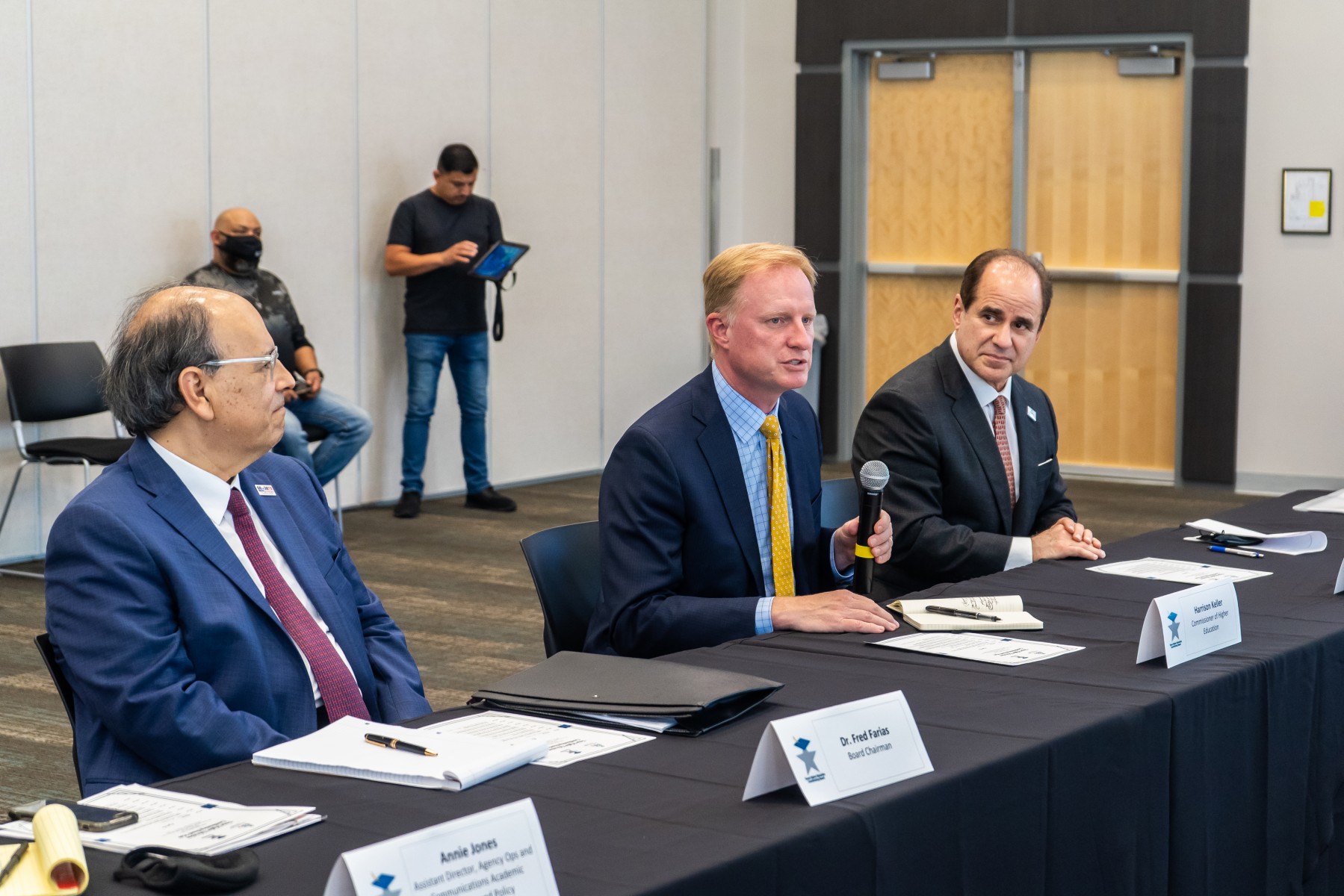‘A shining example for the nation’
College president Dr. Ricardo J. Solis, VPs, and deans welcome THECB Chair Farias and Commissioner Keller
Left to right, Texas Higher Education Coordinating Board Chair Fred Farias III, THECB Commissioner of Higher Education Harrison Keller, and STC President Dr. Ricardo J. Solis participated in a roundtable-style meeting with VPs and deans who were seeking to familiarize Keller with the college Aug. 11.
South Texas College is a shining example not only for the state of Texas but for the entire country, according to chair of the Texas Higher Education Coordinating Board Dr. Fred Farias III.
Speaking at a roundtable-style meeting with THECB Commissioner of Higher Education Harrison Keller, in attendance with STC president Dr. Ricardo J. Solis and college vice presidents and deans on Aug. 11, Farias, a Rio Grande Valley native, took the time to familiarize Keller with the college’s impact in communities.
“We have a unique culture in the Valley, and higher education is the key to young people and to those adult learners coming back, to give them the opportunities to be able to get an education and to do well with their jobs and do well with their families and help us grow our community,” Farias said. “We are so happy that Commissioner Keller is here, and we appreciate your willingness to come and listen to the RGV’s needs.
Farias has witnessed first-hand the needs of the RGV by serving local communities as an optometrist and as a member of many civic, professional, and philanthropic organizations.
“Our culture is different. Our academic needs are different, and our students are unique,” Farias said. “We have a lot of bright students here in the Valley, and South Texas College has created many unique programs and has been a shining example not only for the state of Texas but for the entire country.”
The Texas Higher Education Coordinating Board (THECB) was created by the Texas Legislature in 1965 to represent the highest authority in the state in matters of public higher education.
The Board is comprised of nine members appointed by the Governor for six-year staggered terms and one non-voting student representative who serves for a one-year term. The Governor also appoints the chair and vice-chair, and the Board meets quarterly in Austin.

“We are not only interested, but concerned to make sure that we are meeting the needs of the workforce in the community."
“There’s a ton that going on at the agency right now as you all know,” Keller told STC leaders. “There are some places that have slowed down. There are some areas where we have been able to speed up and have some unique opportunities so we are more than a year ahead on our work to modernize our educational workforce. I think that is going to be very important, and as we move forward.
“The idea isn’t just to modernize the infrastructure, but we’re organizing to make it much more accessible and useful, especially to inform our students who are making decisions for programs and academic affairs and to bring pride to your institution versus other institutions,” Keller said.
The meeting was an opportunity for STC leadership to offer updates as well as concerns on a variety of pressing matters for the college to THECB including the latest on academic programs, transfer concerns, community college state funding, training initiatives with Mexico, discussion of Nursing and Allied Health Programs, and many more.
“It is so great to hear the vision the commissioner brings especially when it comes to affordability, access, and more importantly empathy,” President Solis said. “That is so refreshing to hear. Here at South Texas College, we have very unique challenges and most importantly opportunities due to our (economy) and rapidly growing factories. We are very excited because, just like the college has grown so rapidly in the Valley, our challenges will continue because we have the youngest population in the entire state.
“We are not only interested, but concerned to make sure that we are meeting the needs of the workforce in the community,” Dr. Solis said.



